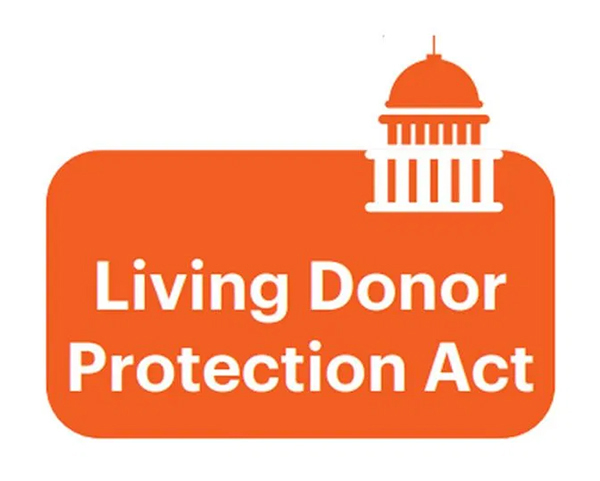Written by Martha Gershun, Guest Blogger
A bipartisan Congressional leadership team from both houses introduced new federal legislation on April 27 designed to protect living organ donors and promote organ donation. The Living Donor Protection Act (H.R. 2923) was introduced by Congressman Jerrold Nadler (D-NY), Congressman Troy Balderson (R-OH), Congresswoman Lisa Blunt Rochester (D-DE), Congressman Jim Costa (D-CA), Congressman John Curtis (R-UT), Congresswoman Diana DeGette (D-CO), Congresswoman Mariannette Miller-Meeks (R-IA), Congressman Gregory F. Murphy, M.D. (R-NC), joined by Senator Kirsten Gillibrand (D-NY) and Senator Tom Cotton (R-AR).
The legislation would prohibit insurance companies from denying, limiting, or charging higher premiums for life, disability, or long-term care insurance to living donors. It would also ensure that living organ donors can use their time granted under the Family and Medical Leave Act (FMLA) to recover from their organ donation surgery. It also directs the U.S. Department of Health and Human Services (HHS) to update their materials on living organ donation to reflect these new protections and encourage more individuals to consider donating an organ.
The proposed law is supported by almost every major kidney and transplant organization, including the American Association of Kidney Patients (AAKP), the National Kidney Foundation (NKF), and the American Society of Transplant Surgeons (ASTS).
As a living kidney donor and advocate for living organ donation, I’m thrilled that Congress is acknowledging the key role that living donors play in saving lives through transplantation. On the other hand, I continue to be disappointed at the modest efforts to address the significant financial barriers faced by potential living organ donors. While protecting the insurability of donors and their rights to use FMLA for transplant-related time off work is important, there is so much more we need to do.
Specifically, the federal government needs to ensure that organ donation is financially neutral, fully reimbursing living donors for their out-of-pocket transplant expenses, such as travel, lodging, food, and child and elder care and compensating them for unpaid time off work to donate. These expenses can add up to be significant. In one 2019 paper, the authors estimate that, on average, the combined costs of travel and lodging, lost wages, and dependent care for a living donor are $13,800. It is easy to see how these costs might prevent many from donating, especially among lower-resourced and under-served populations, increasing transplant disparities.
There have been some efforts to fill this gap. One government agency, the National Living Donor Assistance Center (NLDAC), provides assistance for donors to help cover travel expenses, lost wages, and dependent care expenses if they cannot be reimbursed for these costs by their recipient, a state program, or an insurance company. However, very oddly, donors are only eligible for this program if their recipient’s income is below 350 percent of the poverty line. Thus, a lower-income donor seeking to help a recipient with more resources would not be eligible.
Another source of assistance for some donors is the private nonprofit organization, the National Kidney Registry (NKR), which provides travel and lodging reimbursement, lost wage compensation, and other protections through their Donor Shield Program. This program is available to donors who donate through NKR at one of their Member Centers. This is a valuable resource, but only about 40% of the transplant centers in the U.S. belong to the NKR. Fifteen states have no hospital that is currently eligible.
In contrast, the State of New York recently enacted the New York State Living Donor Support Act which provides direct reimbursement up to $10,000 for donation-related expenses, such as lost wages, travel, lodging, childcare, medications, and medical care to New Yorker residents who donate to a fellow New Yorker.
With this newest legislation the federal government is moving in the right direction to protect the financial interests of living organ donors and increase the number of transplants from living organ donation. But it has a long way to go to make living organ donors truly financially whole.
Martha Gershun is a nonprofit consultant and writer living in Fairway, KS with her husband Don Goldman. Her most recent book, Kidney to Share (Cornell University Press, 2021), with co-author John Lantos, MD, details her experience donating a kidney at the Mayo Clinic to a woman she read about in the newspaper. Gershun is a Special Advisor to the Kidney Transplant Collaborative and serves on the Board of the National Kidney Foundation serving Kansas, Oklahoma, and Western Missouri.

